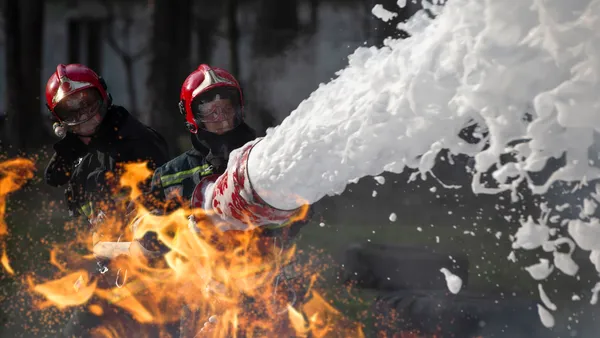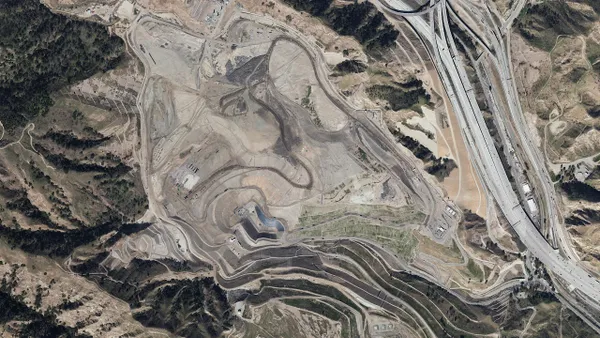Dive Brief:
- The Department of Justice filed a lawsuit on behalf of the U.S. EPA against Norfolk Southern on Friday alleging the rail company violated the Clean Water Act by discharging hazardous substances and pollutants at the East Palestine, Ohio, train derailment beginning Feb. 3.
- Since the derailment, the EPA estimates about 9.2 million gallons of wastewater and 12,932 tons of solid waste have been shipped off-site and is now seeking to make the rail company pay for cleanup.
- “No community should have to go through what East Palestine residents have faced. With today’s action, we are once more delivering on our commitment to ensure Norfolk Southern cleans up the mess they made and pays for the damage they have inflicted as we work to ensure this community can feel safe at home again,” EPA Administrator Michael Regan said in a statement announcing the suit.
Dive Insight:
The civil suit comes as communities across the country raise objections to waste from East Palestine getting disposed of nearby, complicating efforts to remediate the Ohio town.
The suit argues Norfolk Southern violated the Clean Water Act by venting hazardous chemicals and pollutants into waterways from some of the 38 derailed cars in the incident. The agency is seeking penalties and injunctive relief under the Comprehensive Environmental Response, Compensation, and Liability Act to pay for the resulting environmental damage and cleanup.
A spokesperson for Norfolk Southern did not comment directly on the lawsuit but said the company was working at the direction of the EPA on cleanup efforts and would continue do so "until we make it right."
"Our job right now is to make progress every day cleaning up the site, assisting residents whose lives were impacted by the derailment, and investing in the future of East Palestine and the surrounding areas," Senior Communications Manager Connor Spielmaker said in an emailed statement.
Spielmaker said Norfolk Southern’s efforts to monitor the site continue, with nearly 600 air monitoring tests and dioxin and furans waste soil sampling completed, among other measures.
The lawsuit noted at least six hazardous materials contained in at least 11 of the railcars were leaked into the environment as a result of the derailment. Among them, vinyl chloride, butyl acrylate, and benzene are listed as hazardous substances in CERCLA.
Disposing of contaminated soil and wastewater from the site has proven difficult, as communities object to receiving potentially toxic materials.
Maryland officials, including Sens. Chris Van Hollen and Ben Cardin, objected to and ultimately succeeded in preventing Clean Harbors sending wastewater from the site to be treated at the Back River Wastewater Treatment Plant in Baltimore, they announced in a joint statement Thursday.
Oklahoma Gov. Kevin Stitt and Indiana Gov. Eric Holcomb have also attempted to block hazardous materials from the site entering their states, though the EPA sent out a memo on March 17 ordering the states not to do so.
Michigan officials centered around Wayne County have also called on the EPA to ensure that no further material would be sent from East Palestine to a landfill owned by U.S. Ecology, a subsidiary of Republic Services, in Romulus, Michigan. Following the outcry, Michigan’s Department of Environment, Great Lakes and Energy reopened the comment period for the landfill’s hazardous waste license renewal, Michigan Advance reported.
Many of the industry’s largest hazardous waste companies have been involved in the cleanup, including facilities in Grafton, Ohio, and Roachdale, Indiana, according to local news station WESA.
Norfolk Southern, a freight railroad operator with more than 35,000 miles of track headquartered in Atlanta, could be obligated to pay for the EPA’s cleanup work under CERCLA rules governing the response to the release of hazardous materials.
In the case of the East Palestine derailment, the agency’s work includes soil sampling, air sampling and air monitoring, as well as the removal and disposal of hazardous and polluted materials to sites approved by the EPA. The lawsuit seeks to make Norfolk Southern pay for the cost of that response, plus interest.
Potential penalties incurred by the railroad include up to $64,618 per day for the discharge of pollutants into waterways. Norfolk Southern may also be liable for $55,808 per day of violation; or up to $2,232 per barrel of oil, or unit of hazardous substances, discharged into waterways.














